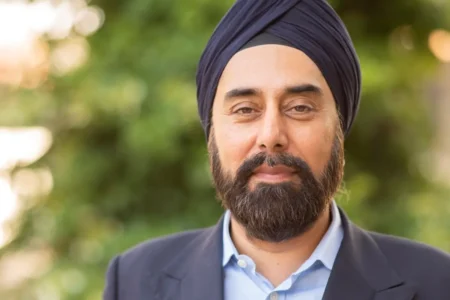In the ever-evolving landscape of economics, where theories and policies shape the future of nations, one name stands out as a beacon of insight and innovation—Jagjit Singh Chadha OBE. Born on December 1, 1966, in West Yorkshire, Chadha has carved an illustrious career that spans academia, policy advisory, and economic research.
His journey from a student of economics to the Director of the National Institute of Economic and Social Research (NIESR) is a testament to his dedication, intellect, and visionary thinking.
Early Life and Education of Jagjit Singh Chadha
Jagjit Singh Chadha’s story begins in West Yorkshire, where he was born into a family that valued education and hard work. His academic journey took him from The John Lyon School to University College London and the prestigious London School of Economics.
These formative years laid the groundwork for Chadha’s deep understanding of monetary theory and macroeconomic stabilisation, subjects that would become the cornerstone of his professional life.
Academic and Professional Achievements
Chadha’s early career saw him delve into the intricacies of monetary economics at the Bank of England, where he focused on the interaction of financial markets and monetary regimes. His expertise soon led him to academia, where he served as Professor and Chair in Money and Banking at the University of Kent.
Concurrently, he held the position of Professor of Commerce at Gresham College from 2014 to 2018, and chaired the Money, Macro, and Finance Research Group, now known as the Money Macro and Finance Society.
In 2016, Chadha’s journey reached a new milestone when he was appointed Director of NIESR. Under his leadership, NIESR has continued to be a leading institution in economic research, offering valuable insights into the UK’s economic landscape.
Research Interests and Contributions
Jagjit Singh Chadha’s research interests are as diverse as they are profound. His work primarily revolves around monetary theory, macroeconomic stabilisation, and the history of business cycles and financial evolution.
He is particularly fascinated by the role of financial intermediation as a source and propagation mechanism for economic shocks. This focus has positioned Chadha as a key voice in understanding and addressing economic crises.
One of Chadha’s notable advocacies is flexible inflation targeting, which involves central bank communications outlining policy rate paths under different scenarios. His open letter to Andrew Bailey underscores his commitment to transparent and adaptive economic policies.
Chadha has also been a vocal critic of the prolonged and extensive Quantitative Easing (QE) programs by central banks. His views, articulated in publications like the Financial Times, highlight the need for a more measured approach to monetary policy.
A Visionary in Economic Policy
Throughout his career, Jagjit Singh Chadha has consistently called for a complete overhaul of the fiscal framework. He argues against the reliance on arbitrary and malleable rules, advocating instead for a more robust and adaptable system.
His work, “Designing a New Fiscal Framework: Understanding and Confronting Uncertainty,” published as an NIESR Occasional Paper, offers a comprehensive analysis and blueprint for such a transformation.
During the COVID-19 pandemic, Jagjit Singh Chadha’s insights were invaluable. He regularly highlighted the lack of a coherent plan and objective, which led to policy drift. His commentary in the UK Economic Outlook Winter 2021 issue provided a critical perspective on navigating post-pandemic economic challenges.
Honours and Advisory Roles
Jagjit Singh Chadha’s contributions to economics have not gone unnoticed. In 2021, he was appointed Officer of the Order of the British Empire (OBE) for his services to economics and economic policy. This honour is a reflection of his impact on both national and international economic discourse.
Beyond his role at NIESR, Chadha has served as an academic adviser to HM Treasury, the Bank of England, the Treasury Select Committee, and the Bank for International Settlements. He is the current Editor of the Modern Macroeconomic Policy-making series published by Cambridge University Press and manages the National Institute Economic Review.
Chadha’s influence extends to the Economic Statistics Centre of Excellence (ESCoE) at NIESR, established in collaboration with the Office for National Statistics (ONS) in 2019. He also plays a key role in the Economics Observatory and serves on the Advisory Council of the Bennett Institute.
A Leader in Economic Thought
Jagjit Singh Chadha’s election to the Council of the Royal Economic Society in 2019 marked another significant milestone in his career. His leadership and expertise continue to shape economic research and policy-making. As an executive member of the Productivity Institute and chair of the Productivity Commission, Chadha is at the forefront of efforts to enhance productivity and economic growth.
Under his guidance, NIESR established the UK Business Cycle Dating Committee in 2018, where he serves as Chair. This committee plays a crucial role in identifying and understanding economic cycles, providing valuable insights for policy-makers and researchers alike.
Also Read:Dinesh Kumar Makhan Lal Bhugra: Pioneering Psychiatry Across Cultures
